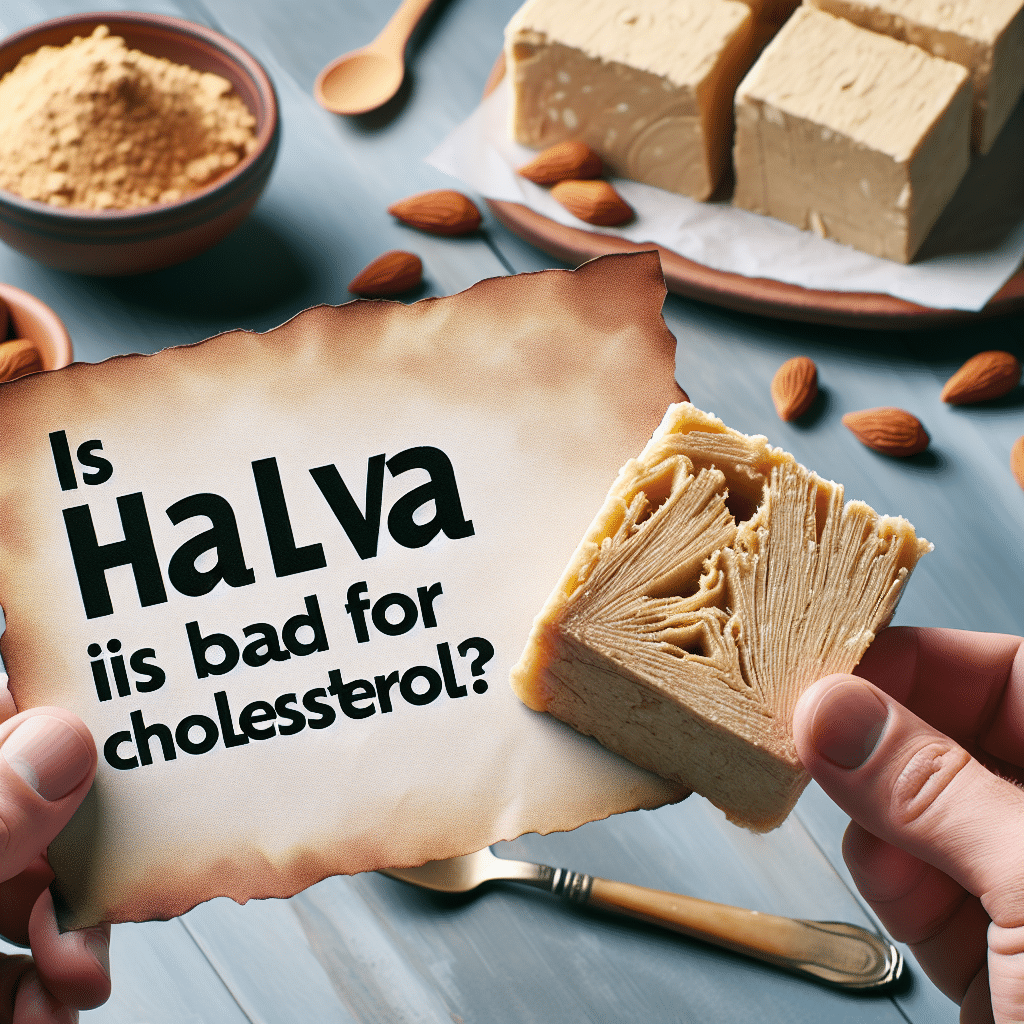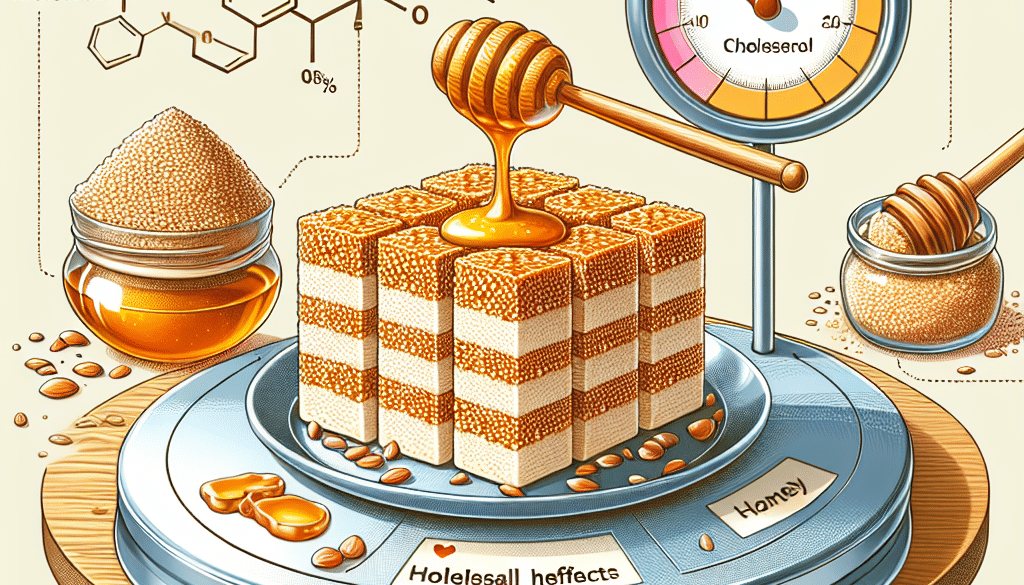Is Halva Bad For Cholesterol?
-
Table of Contents
- Halva and Cholesterol: A Comprehensive Analysis
- Understanding Cholesterol and Its Impact on Health
- The Nutritional Composition of Halva
- Is Halva Bad for Cholesterol?
- Research and Case Studies on Sesame Seeds and Cholesterol
- Healthy Alternatives and Modifications
- Conclusion: Balancing Tradition with Health
- Explore ETprotein’s Heart-Healthy Protein Products
Halva and Cholesterol: A Comprehensive Analysis

Halva, a dense, sweet confection originating from the Middle East, has been a traditional treat enjoyed across various cultures for centuries. Made primarily from sesame seeds or other nut butters and sweeteners, halva is known for its rich flavor and crumbly texture. However, in an age where health consciousness is on the rise, many individuals are questioning the impact of traditional foods on their health, particularly concerning cholesterol levels. This article delves into whether halva is bad for cholesterol, exploring its ingredients, nutritional profile, and the potential effects on heart health.
Understanding Cholesterol and Its Impact on Health
Before assessing halva’s influence on cholesterol, it’s essential to understand what cholesterol is and why it matters. Cholesterol is a waxy substance found in the blood, necessary for building cells and producing certain hormones. However, high levels of cholesterol, particularly low-density lipoprotein (LDL) or “bad” cholesterol, can lead to plaque buildup in arteries, increasing the risk of heart disease and stroke.
The Nutritional Composition of Halva
Halva’s primary ingredient, sesame seeds or tahini, is a good source of monounsaturated and polyunsaturated fats, which are considered heart-healthy fats. These fats can help reduce LDL cholesterol levels when they replace saturated and trans fats in the diet. However, halva also typically contains sugar and, in some recipes, saturated fats like butter or palm oil, which can negatively impact cholesterol levels.
Is Halva Bad for Cholesterol?
The answer to whether halva is bad for cholesterol is not straightforward. It largely depends on the specific ingredients used in the halva and the overall dietary pattern of an individual. Here are some factors to consider:
- Portion Size: Consuming halva in moderation is key. A small serving as an occasional treat may not significantly impact cholesterol levels, but regular or large consumption could contribute to higher LDL cholesterol.
- Ingredients: Some halva recipes are higher in saturated fats, which can raise LDL cholesterol. Opting for versions made with heart-healthy oils and less sugar can be a better choice for those monitoring their cholesterol.
- Dietary Context: The overall diet matters. A diet high in fruits, vegetables, whole grains, and lean proteins can help mitigate the effects of occasional treats like halva.
Research and Case Studies on Sesame Seeds and Cholesterol
Several studies have investigated the effects of sesame seeds on cholesterol levels. For instance, a study published in the “Journal of Medicinal Food” found that sesame seed consumption could lower cholesterol and triglycerides in hyperlipidemic patients. However, these studies often look at sesame seeds in isolation rather than as part of a confection like halva.
Healthy Alternatives and Modifications
For those concerned about cholesterol, there are ways to enjoy halva without significantly impacting health:
- Reduced Sugar: Look for halva varieties with less added sugar or use natural sweeteners like honey in moderation.
- Healthy Fats: Choose halva made with unsaturated fats like olive oil instead of butter or palm oil.
- Portion Control: Enjoy smaller portions of halva as part of a balanced diet.
Conclusion: Balancing Tradition with Health
In conclusion, halva can be part of a healthy diet when consumed in moderation and as part of a balanced dietary pattern. While it contains heart-healthy fats from sesame seeds, the added sugars and potential saturated fats call for mindful consumption, especially for individuals with cholesterol concerns. By understanding the ingredients and making informed choices, one can enjoy halva without significantly impacting cholesterol levels.
Explore ETprotein’s Heart-Healthy Protein Products
If you’re looking for alternative protein sources that can contribute to a heart-healthy diet, consider ETprotein’s range of organic bulk vegan proteins. These products are designed to support various dietary needs while being mindful of cardiovascular health.
ETprotein offers a variety of plant-based proteins, such as organic rice protein, pea protein, and pumpkin seed protein, which are free from common allergens and non-GMO. These proteins are not only beneficial for those looking to manage their cholesterol levels but also for anyone seeking to incorporate high-quality, plant-based nutrition into their diet.
For more information on how ETprotein’s products can fit into a heart-healthy lifestyle, please contact them at sales(at)ETprotein.com.
About ETprotein:
ETprotein, a reputable protein and L-(+)-Ergothioneine (EGT) Chinese factory manufacturer and supplier, is renowned for producing, stocking, exporting, and delivering the highest quality organic bulk vegan proteins and L-(+)-Ergothioneine. They include Organic rice protein, clear rice protein, pea protein, clear pea protein, watermelon seed protein, pumpkin seed protein, sunflower seed protein, mung bean protein, peanut protein, and L-(+)-Ergothioneine EGT Pharmaceutical grade, L-(+)-Ergothioneine EGT food grade, L-(+)-Ergothioneine EGT cosmetic grade, L-(+)-Ergothioneine EGT reference grade and L-(+)-Ergothioneine EGT standard. Their offerings, characterized by a neutral taste, non-GMO, allergen-free attributes, with L-(+)-Ergothioneine purity over 98%, 99%, cater to a diverse range of industries. They serve nutraceutical, pharmaceutical, cosmeceutical, veterinary, as well as food and beverage finished product distributors, traders, and manufacturers across Europe, USA, Canada, Australia, Thailand, Japan, Korea, Brazil, and Chile, among others.
ETprotein specialization includes exporting and delivering tailor-made protein powder and finished nutritional supplements. Their extensive product range covers sectors like Food and Beverage, Sports Nutrition, Weight Management, Dietary Supplements, Health and Wellness Products, and Infant Formula, ensuring comprehensive solutions to meet all your protein needs.
As a trusted company by leading global food and beverage brands and Fortune 500 companies, ETprotein reinforces China’s reputation in the global arena. For more information or to sample their products, please contact them and email sales(at)ETprotein.com today.












